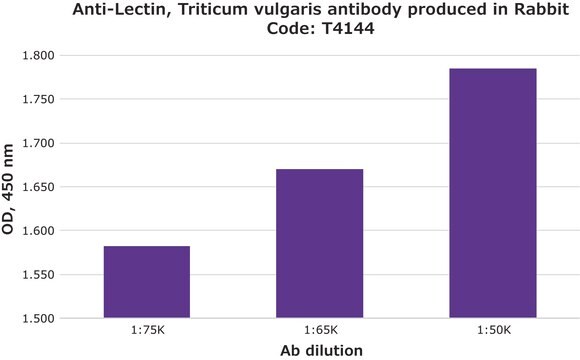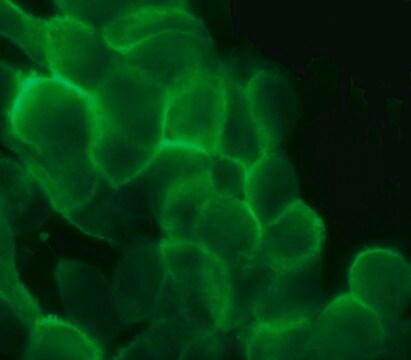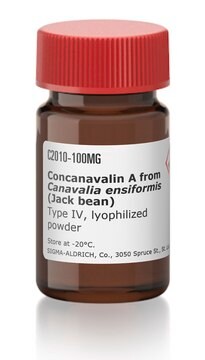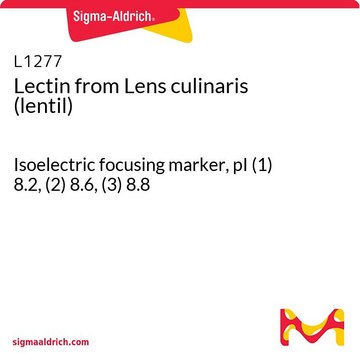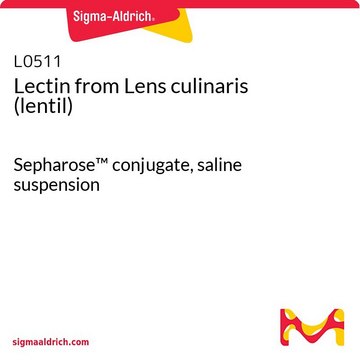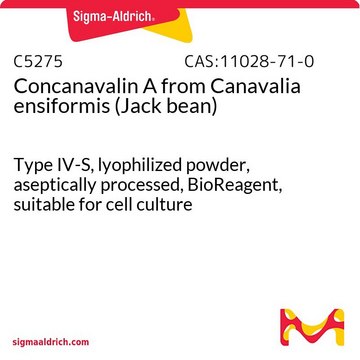C7401
Anti-Lectin, Canavalia ensiformis antibody produced in rabbit
fractionated antiserum, lyophilized powder
Synonym(s):
Anti-Con A, Anti-Jack Bean Concanavalin A
Sign Into View Organizational & Contract Pricing
All Photos(1)
About This Item
Recommended Products
biological source
rabbit
Quality Level
conjugate
unconjugated
antibody form
fractionated antiserum
antibody product type
primary antibodies
clone
polyclonal
form
lyophilized powder
species reactivity
Canavalia ensiformis
packaging
vial of ~2 mL lyophilized antiserum
technique(s)
indirect ELISA: 1:25,000
storage temp.
2-8°C
target post-translational modification
unmodified
Immunogen
Jack Bean Concanavalin A (Con A).
Application
Anti-Lectin, Canavalia ensiformis antibody produced in rabbit has been used in:
- enzyme-linked immunosorbent assays (ELISA)
- immunochemistry
- enhanced chemiluminescence ECL™ western blot analysis
- western blot
Biochem/physiol Actions
Concanavalin A is a lectin isolated from Canavalia ensiformis or Jack bean seeds. It has potent mitogenic effect on T cells and triggers the activity of both helper and suppressor T cells exhibiting immune regulator activity. Con A triggers autophagy by binding on the cell membrane glycoprotein and is internalized to the mitochondria. It activates immune response in liver and displays anti-hepatoma effect.
Target description
Lectins are highly specific carbohydrate binding proteins useful in carbohydrate and cell membrane studies, as well as cell agglutination and typing techniques.
Physical form
Lyophilized from 0.01 M phosphate buffered saline, pH 7.2.
Reconstitution
Reconstitute with 2 mL deionized water.
Storage and Stability
Prior to reconstitution store the product at 2-8 °C. After reconstitution, the solution may be stored frozen in working aliquots. Repeated freezing and thawing is not recommended. If slight turbidity occurs upon prolonged storage clarify the solution by centrifugation before use.
Legal Information
ECL is a trademark of Cytiva
Disclaimer
Unless otherwise stated in our catalog or other company documentation accompanying the product(s), our products are intended for research use only and are not to be used for any other purpose, which includes but is not limited to, unauthorized commercial uses, in vitro diagnostic uses, ex vivo or in vivo therapeutic uses or any type of consumption or application to humans or animals.
Not finding the right product?
Try our Product Selector Tool.
Storage Class Code
11 - Combustible Solids
WGK
WGK 3
Flash Point(F)
Not applicable
Flash Point(C)
Not applicable
Personal Protective Equipment
dust mask type N95 (US), Eyeshields, Gloves
Choose from one of the most recent versions:
Already Own This Product?
Find documentation for the products that you have recently purchased in the Document Library.
B Fairburn et al.
Biochimie, 88(9), 1165-1174 (2006-05-13)
The stress protein gp96 exhibits a number of immunological activities, the majority of studies into which have used gp96 purified from a variety of tissues. On the basis of 1-D gel electrophoresis, the purity of these preparations has been reported
Nicolas Sauvion et al.
Journal of insect physiology, 50(12), 1137-1150 (2005-01-27)
Concanavalin A (lectin from Canavalia ensiformis L., ConA) has previously been shown to act as a feeding inhibitor for Acyrthosiphon pisum, the pea aphid. In the present study a range of histochemical and biochemical techniques were used to elucidate the
The use of concanavalin A to study the immunoregulation of human T cells.
J M Dwyer et al.
Clinical and experimental immunology, 46(2), 237-249 (1981-11-01)
M Malerba et al.
Biochemical and biophysical research communications, 286(5), 984-990 (2001-08-31)
Several authors previously showed that the interaction between 14-3-3 proteins and plasma membrane H(+)-ATPase leads to an activated complex in which the enzyme is endowed with more favorable kinetic parameters and a more physiological pH optimum. In this paper we
Hai-Xia Wang et al.
World journal of gastroenterology, 18(2), 119-125 (2012-01-19)
As a chronic inflammatory disease of the liver, the pathogenic mechanisms of autoimmune hepatitis (AIH) have not yet been elucidated, with prognosis and diagnosis remaining unsatisfied. Currently the only viable treatments of AIH are immunosuppressant application and liver transplantation. It
Our team of scientists has experience in all areas of research including Life Science, Material Science, Chemical Synthesis, Chromatography, Analytical and many others.
Contact Technical Service